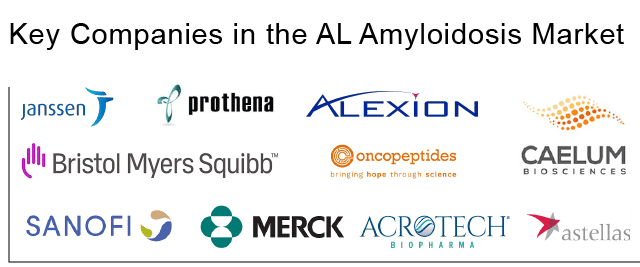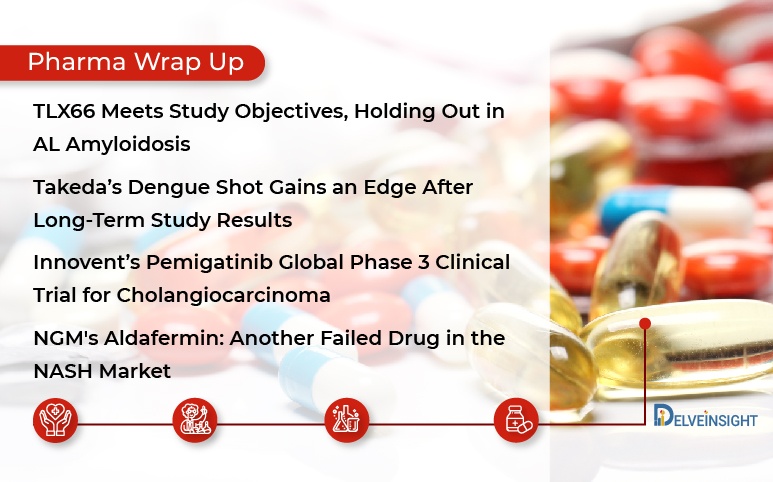Assessing How Emerging Therapies Will Transform the AL Amyloidosis Treatment Dynamics
May 13, 2022
Table of Contents
AL Amyloidosis is a rare disease, with around 8,500 new cases diagnosed each year in the 7MM. This disease mostly affects elderly persons median age of 64, with slight male predominance (54%). As per our estimates, the highest AL Amyloidosis incidence was observed in the US in 2021. Moreover, there are more than 30 different types of amyloid proteins. Each amyloid protein is structured in a structure known as a fibril, which is made up of low molecular weight proteins produced from precursor proteins. Amyloid fibrils can float in blood plasma and deposit in tissues throughout the body. Amyloid light chain (AL) amyloidosis, commonly known as primary amyloidosis, is the most common form of systemic amyloidosis. Historically, systemic light-chain (AL) Amyloidosis was thought to be an unavoidable fatal condition. Prior to effective treatments for the underlying plasma cell dyscrasia, the AL Amyloidosis prognosis was bleak, with an estimated AL Amyloidosis life expectancy of 13 months and only 6 months for those with symptomatic heart involvement. The current AL Amyloidosis staging systems rely on markers of myocardial cell injury and heart failure, which are very sensitive to cardiac involvement in amyloidosis.
The AL Amyloidosis symptoms are not noticed until the disease has progressed. When signs and symptoms appear, they are determined by which of the organs is affected. Among the common AL Amyloidosis symptoms include swelling of the ankles and legs, severe fatigue and weakness, shortness of breath with minimal exertion, diarrhea, possibly with blood, or constipation, numbness, tingling, or pain in the hands or feet, and others.
Downloads
Click Here To Get the Article in PDF
The generic and often ambiguous character of symptoms associated with AL amyloidosis typically causes diagnostic delays, resulting in organ damage by the time therapy is commenced. The AL amyloidosis diagnosis should be considered in patients with unexplained proteinuria, cardiomyopathy, neuropathy, or hepatomegaly and in patients with multiple myeloma that has atypical manifestations. The presence of amyloid in tissue as well as a plasma cell dyscrasia is required for the AL amyloidosis diagnosis.
AL Amyloidosis Treatment Landscape
The goal of AL Amyloidosis treatment is to swiftly lower the plasma cell clone to rescue organ function by enhancing amyloid reabsorption to rapidly improve heart function and patients’ QOL and survival. In suitable individuals, chemotherapy (both conventional and high dose) combined with autologous hematopoietic stem cell transplantation (ASCT) efficiently suppresses amyloid light chain formation. Melphalan, dexamethasone, and bortezomib-based regimens (BMDex) are advised for individuals who are ineligible for ASCT. One therapy option recommended by the National Comprehensive Cancer Network is high-dose melphalan followed by ASCT.
AL Amyloidosis treatment is highly individualized, based on age, organ dysfunction, and regimen toxicity, and should be guided by hematologic and cardiac response indicators. Almost two-thirds of patients benefit from alkylator-based chemotherapy. Novel agents are also in use, and experiments to determine the best way to employ them are continuing. Daratumumab (Janssen Pharmaceuticals), Birtamimab (Prothena), CAEL-101 (AstraZeneca/Caelum Biosciences), Melflufen (Oncopeptides AB), and Elotuzumab (Bristol-Myers Squibb) are among the novel drugs which are expected to fuel AL Amyloidosis treatment landscape.
For more insights, check out our infographics @ AL Amyloidosis Treatment Outlook
Emerging Therapies for AL Amyloidosis Treatment
The AL Amyloidosis pipeline is looking promising and robust. Some of the key AL Amyloidosis companies focussing to offer potential new AL Amyloidosis treatment options for patients include Janssen Pharmaceutical, Prothena, Alexion Pharmaceuticals, Oncopeptides AB, Bristol-Myers Squibb, Caelum Biosciences, Merck, Acrotech biopharma, Astellas Pharma GmbH, among others. The promising AL Amyloidosis therapies in the late stage of AL Amyloidosis clinical trials are:
CAEL‐101: Caelum Biosciences
CAEL101 is a fibril‐reactive monoclonal antibody (mAb) that is specific for amyloid fibrils. It is a chimeric immunoglobulin G1 kappa isotype that responds with light chain fibrils regardless of their isotype but not with the native forms. CAEL-101 has been designated as an orphan drug by the US Food and Drug Administration and the European Medicine Agency as an AL Amyloidosis treatment for patients. The drug is currently in Phase III clinical trials for the amyloid light chain (“AL”) Amyloidosis treatment.

In August 2020, Caelum Biosciences began a double-blind, randomized, multicenter international Phase 3 study of CAEL-101 in combination with standard of care (SoC) for plasma cell dyscrasia (PCD) versus placebo in patients with Mayo stage IIIa AL amyloidosis who have not received prior treatment. The major goal of this research is to see if CAEL-101 improves overall survival in people with cardiac AL Amyloidosis. With the projected participation of 267 individuals, the study is expected to be completed by February 2023.
Daratumumab: Janssen Pharmaceuticals
Daratumumab (Darzalex) is an IgG1k monoclonal antibody that binds to CD38 and is the first-CD38 directed targeted therapy. Daratumumab binds to a distinct amino-acid sequence on the CD38 epitope that causes cell death via antibody-dependent cellular cytotoxicity, complement-dependent cytotoxicity, or antibody-dependent cellular phagocytosis.
Based on the findings and response of the Phase III ANDROMEDA study, the FDA granted AL Amyloidosis Daratumumab accelerated approval as the first-line therapy for AL Amyloidosis treatment in combination with bortezomib, cyclophosphamide, and dexamethasone (CyBorD). Moreover, the European Commission (EC) has also approved Darzalex SC, a daratumumab subcutaneous (SC) formulation (daratumumab and hyaluronidase-fihj), in combination with bortezomib, cyclophosphamide, and dexamethasone (VCd), for the systemic light-chain (AL) Amyloidosis treatment in the newly diagnosed adult patients. The European Commission has also designated it as an orphan drug for the AL Amyloidosis treatment.
Birtamimab: Prothena
Birtamimab is an investigational monoclonal antibody designed to effectively and selectively target and remove the amyloid that accumulates in individuals with AL amyloidosis and causes organ dysfunction and failure. The drug is currently being evaluated by Prothena in Phase III clinical studies. The FDA granted Fast Track Designation to Birtamimab for the treatment of Mayo Stage IV patients with AL amyloidosis to lower the risk of death, and both the FDA and the European Medicines Agency granted Orphan Drug Designation.
The multicenter, global, randomized, double-blind, placebo-controlled Phase 3 research will assess the effectiveness and safety of birtamimab in Mayo Stage IV AL amyloidosis patients. The primary objective is to examine the effectiveness of birtamimab by measuring time to all-cause mortality. As the standard of care, all patients will undergo a bortezomib-containing chemotherapy regimen.
Approximately 150 newly diagnosed Mayo Stage IV AL amyloidosis patients will be recruited and randomized to birtamimab or placebo in a 2:1 ratio. Subjects will remain in the trial until the predetermined number of occurrences (all-cause mortality) is met. The drug is expected to be launched in 2025 in the US for the AL Amyloidosis treatment.
Isatuximab: Sanofi
Isatuximab (SAR650984) is an IgG1k monoclonal antibody that binds to CD38 expressed on plasma cells in AL amyloidosis with great affinity. It has been demonstrated to be effective and well-tolerated as a single drug and in combination in relapsed and refractory multiple myeloma.
Sanofi began a Phase 2, open-label, multicenter, single-stage study in December 2021 to assess the efficacy of Isatuximab Plus Pomalidomide and Dexamethasone (IPd) in patients with AL Amyloidosis not in VGPR or better after any previous therapy. This phase 2 trial aims to assess the effectiveness of isatuximab in combination with pomalidomide and dexamethasone (IPd) in individuals with AL amyloidosis who have not responded to prior treatment. It will recruit 46 patients (34 in France and 12 in Australia) from 15 different locations (11 in France and 4 in Australia). The trial, which currently has 46 participants, is expected to be completed by August 2024.
Expected Roadblocks in AL Amyloidosis Treatment Market
DelveInsight estimates a surge in the AL Amyloidosis market size owing to the increased awareness and collaboration between leading market players (commercialization of Darzalex Faspro by Genmab and Janssen Biotech, acquisition of Caelum Biosciences by AstraZeneca in 2021). The AL Amyloidosis market size was approximately USD 900 million in the 7MM in 2021, which is further anticipated to surge by 2032 growing with a significant CAGR. The robust pipeline with the novel, first-in-class therapies for AL Amyloidosis treatment is one of the primary factors propelling the AL Amyloidosis treatment market.
However, the epidemiology data on AL amyloidosis is poor, and retrospective analysis reduces the data’s authenticity, thereby, limiting the growth of the AL Amyloidosis treatment market. Moreover, the disease’s complex heterogeneity delays diagnosis, resulting in severe disease (organ malfunction – heart, kidney, liver), lowering AL Amyloidosis survival rates, and thus acting as a barrier to the AL Amyloidosis treatment market growth. Furthermore, AL Amyloidosis clinical trials are difficult due to low patient enrollment and a lack of clearly defined new outcomes. The involvement of the cardiac and kidney organs results in a significant treatment cost. Furthermore, the anticipated launches are likely to be more expensive than myeloma-based medicines, thereby limiting AL Amyloidosis market availability and affordability. Moreover, in the era of daratumumab-based frontline therapy, the function of upfront ASCT in eligible patients must be defined further. Hence, the above-mentioned factors are the current roadblock to the AL Amyloidosis treatment.
Way Ahead
The ever-changing therapeutic field in Multiple Myeloma provides a glimpse of what is to come in the AL Amyloidosis treatment, although in a modified form. One of the most serious concerns with innovative anti-clonal regimens, critical pathway inhibitors, and immune system engagers is their toxicity. Risk assessment and therapy customization, in conjunction with the provision of specialist supportive care, will thus remain critical to the management of this distinct patient population. Anti-clonal agents must be evaluated in the context of AL Amyloidosis treatment, especially for distinct patterns of organ involvement and degrees of organ dysfunction. Finally, it will be obvious that the efficient removal of the plasma cell clone is simply one component of the reason for AL Amyloidosis treatment. Targeting and efficient clearance of amyloid deposits is predicted to become an essential component of future AL Amyloidosis treatment regimens. Adoption and adaptation are thus critical for the future of the AL Amyloidosis treatment landscape.

FAQs
Amyloidosis is a rare disease resulting from abnormal protein deposits, called amyloid, in various tissues of the body. Depending on the structure of the particular amyloid, the protein can accumulate in an isolated tissue or be widespread, affecting numerous organs and tissues.
The common AL Amyloidosis symptoms include swelling of the ankles and legs, severe fatigue and weakness, shortness of breath with minimal exertion, diarrhea, possibly with blood, or constipation, numbness, tingling, or pain in the hands or feet, and others.
Daratumumab (Janssen Pharmaceuticals), Birtamimab (Prothena), CAEL-101 (AstraZeneca/Caelum Biosciences), Melflufen (Oncopeptides AB), and Elotuzumab (Bristol-Myers Squibb) are among the novel drugs which are expected to fuel AL Amyloidosis treatment landscape.
The AL amyloidosis diagnosis should be considered in patients with unexplained proteinuria, cardiomyopathy, neuropathy, or hepatomegaly and in patients with multiple myeloma that has atypical manifestations.
Key AL Amyloidosis companies focussing to offer potential new treatment options for patients include Janssen Pharmaceutical, Prothena, Alexion Pharmaceuticals, Oncopeptides AB, Bristol-Myers Squibb, Caelum Biosciences, Merck, Acrotech biopharma, Astellas Pharma GmbH, among others.



